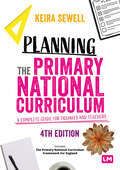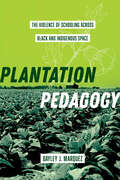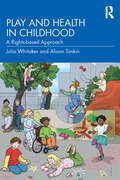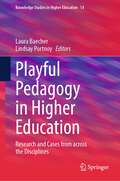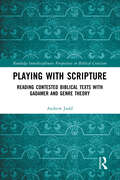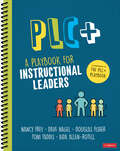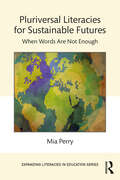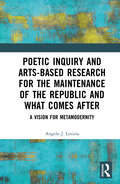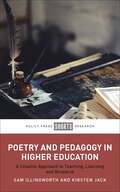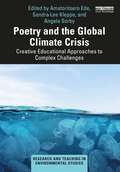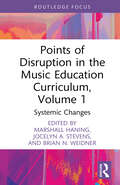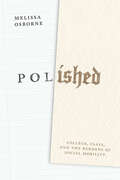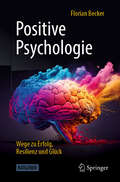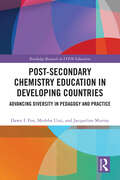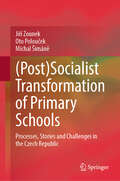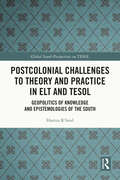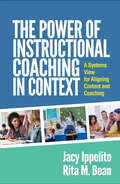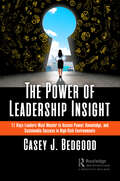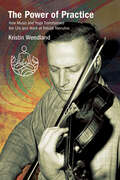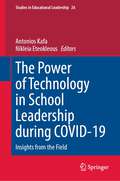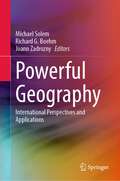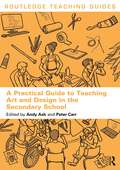- Table View
- List View
Planning the Primary National Curriculum: A complete guide for trainees and teachers (Ready to Teach)
by Keira SewellA complete guide for trainees and teachers To prepare to teach the Primary National Curriculum, trainee teachers need more than just the Programmes of Study. They need a resource to help them understand, plan for, teach and assess the curriculum. This is their guide to planning the Primary National Curriculum. This book explores how to plan in primary schools. It covers curriculum design and structure, challenges to learning, and how children learn. This 4th edition includes a new chapter on Adaptive Teaching. For each curriculum subject the programme of study is included, with notes to help students interpret it in practice. The text covers how the teaching of each subject can be organised, assessment opportunities, key and essential resources in each subject, and how ICT can best be used in each subject to enhance teaching. Sequenced lesson examples in all subject chapters link theory to practice and highlight progression. The final section of the book explores the many ways in which the curriculum can be delivered. It includes the creative curriculum, dialogic teaching, cross-curricular learning and more current thinking about interpreting the curriculum.
Planning the Primary National Curriculum: A complete guide for trainees and teachers (Ready to Teach)
by Keira SewellA complete guide for trainees and teachers To prepare to teach the Primary National Curriculum, trainee teachers need more than just the Programmes of Study. They need a resource to help them understand, plan for, teach and assess the curriculum. This is their guide to planning the Primary National Curriculum. This book explores how to plan in primary schools. It covers curriculum design and structure, challenges to learning, and how children learn. This 4th edition includes a new chapter on Adaptive Teaching. For each curriculum subject the programme of study is included, with notes to help students interpret it in practice. The text covers how the teaching of each subject can be organised, assessment opportunities, key and essential resources in each subject, and how ICT can best be used in each subject to enhance teaching. Sequenced lesson examples in all subject chapters link theory to practice and highlight progression. The final section of the book explores the many ways in which the curriculum can be delivered. It includes the creative curriculum, dialogic teaching, cross-curricular learning and more current thinking about interpreting the curriculum.
Plantation Pedagogy: The Violence of Schooling across Black and Indigenous Space (American Crossroads #72)
by Bayley J. MarquezThroughout the nineteenth and twentieth centuries, teachers, administrators, and policymakers fashioned a system of industrial education that attempted to transform Black and Indigenous peoples and land. This form of teaching—what Bayley J. Marquez names plantation pedagogy—was built on the claim that slavery and land dispossession are fundamentally educational. Plantation pedagogy and the formal institutions that encompassed it were thus integrally tied to enslavement, settlement, and their inherent violence toward land and people. Marquez investigates how proponents developed industrial education domestically and then spread the model abroad as part of US imperialism. A deeply thoughtful and arresting work, Plantation Pedagogy sits where Black and Native studies meet in order to understand our interconnected histories and theorize our collective futures.
Play and Health in Childhood: A Rights-based Approach
by Julia Whitaker Alison TonkinTaking a rights-based approach to the interdependence of play and health in childhood, this text argues that the child’s right to health and development cannot be satisfied without also the fulfillment of their right to play. Underpinned by theory and real-life ‘case stories’ drawn from practice and family life, Whitaker and Tonkin present what is known about the benefits of play and its potential to address the pressing health needs in the short and long terms of the youngest generation. They define and discuss the concepts of childhood, play, health, and human rights before exploring how play interacts with the four fundamental principles of the UN Convention on the Rights of the Child: non-discrimination; best interests; life, survival, and development; and inclusion and participation. The book then investigates how practitioners can advocate for the child’s right to play to meet all their health and development needs. It presents numerous examples of best practice from a range of settings – including hospitals, schools, community initiatives, charities, families, and more – and incorporates the voices of children as they imagine a future in which play is elevated to a central position in their lives, allowing for the achievement of lifelong health and happiness. Exploring children’s rights from a practical perspective, this accessible book is essential reading for students and practitioners in healthcare, social work, community work, early years, and education.
Playful Pedagogy in Higher Education: Research and Cases from across the Disciplines (Knowledge Studies in Higher Education #14)
by Laura Baecher Lindsay PortnoyThis collection provides a wide array of concrete and inspiring "playful" approaches to teaching in a range of higher education contexts and discipline areas, grounded in the learning sciences and within a future-oriented revisioning of the university learning environment. Within the broad area of active learning strategies, this text offers a curated collection of creative innovations such as game-based learning, gamification of courses, escape rooms, semester-long quests, dramatic role-plays, artistic endeavors and more. Containing descriptive and impact research that evidences the power of playful pedagogy, this text will offer a range of novel, transferable and usable materials for readers to apply in their lecture halls and classrooms tomorrow.
Playing with Scripture: Reading Contested Biblical Texts with Gadamer and Genre Theory (Routledge Interdisciplinary Perspectives on Biblical Criticism)
by Andrew JuddThis book puts a creative new reading of Hans-Georg Gadamer’s philosophical hermeneutics and literary genre theory to work on the problem of Scripture. Reading texts as Scripture brings two hermeneutical assumptions into tension: that the text will continually say something new and relevant to the present situation, and that the text has stability and authority over readers. Given how contested the Bible’s meaning is, how is it possible to ‘read Scripture’ as authoritative and relevant? Rather than anchor meaning in author, text or reader, Gadamer’s phenomenological model of hermeneutical experience as Spiel (‘play’) offers a dynamic, intersubjective account of how understanding happens, avoiding the dead end of the subjective–objective dichotomy. Modern genre theory addresses some of the criticisms of Gadamer, accounting for the different roles played by readers in different genres using the new term Lesespiel (‘reading game’). This is tested in three case studies of contested texts: the recontextualization of psalms in the book of Acts, the use of Hagar’s story (Genesis 16) in nineteenth-century debates over slavery and the troubling reception history of the rape and murder in Gibeah (Judges 19). In each study, the application of ancient text to contemporary situation is neither arbitrary, nor slavishly bound to tradition, but playful.
Playing with Scripture: Reading Contested Biblical Texts with Gadamer and Genre Theory (Routledge Interdisciplinary Perspectives on Biblical Criticism)
by Andrew JuddThis book puts a creative new reading of Hans-Georg Gadamer’s philosophical hermeneutics and literary genre theory to work on the problem of Scripture. Reading texts as Scripture brings two hermeneutical assumptions into tension: that the text will continually say something new and relevant to the present situation, and that the text has stability and authority over readers. Given how contested the Bible’s meaning is, how is it possible to ‘read Scripture’ as authoritative and relevant? Rather than anchor meaning in author, text or reader, Gadamer’s phenomenological model of hermeneutical experience as Spiel (‘play’) offers a dynamic, intersubjective account of how understanding happens, avoiding the dead end of the subjective–objective dichotomy. Modern genre theory addresses some of the criticisms of Gadamer, accounting for the different roles played by readers in different genres using the new term Lesespiel (‘reading game’). This is tested in three case studies of contested texts: the recontextualization of psalms in the book of Acts, the use of Hagar’s story (Genesis 16) in nineteenth-century debates over slavery and the troubling reception history of the rape and murder in Gibeah (Judges 19). In each study, the application of ancient text to contemporary situation is neither arbitrary, nor slavishly bound to tradition, but playful.
PLC+: A Playbook for Instructional Leaders
by Nancy Frey Dave Nagel Douglas Fisher Toni Osborn Faddis Aida Allen-RotellBuild cohesive PLC+ teams to improve learning outcomes Effective teacher collaboration can amplify student learning and well-being outcomes, increase teacher satisfaction rates, and improve the onboarding of new teachers. Yet developing a cohesive PLC+ team isn’t always so simple. Designed as a companion to PLC+: Better Decisions and Greater Impact by Design and The PLC+ Playbook, this easy-to-use playbook for school leaders provides strategies, techniques, and evidence-based approaches to help leaders foster successful collaboration among teachers and positively impact student learning. Four cross-cutting values are infused within each guiding question: high expectations, activation, individual and collective teacher efficacy, and equity. Building on this framework and drawing from Visible Learning research, the guide offers specific instructional leadership actions and behaviors to promote cohesion in PLC+ teams. Leaders will learn: Contextual information to boost knowledge about effectively engaging with adults Essential information on how to lead PLC+ teams to become strong, interdependent, and productive Leadership tools to support and inspire others to work at optimal levels Examples and insights into time management, decision-making, successes, failures, and learning opportunities Discover how to build social, human, and decisional capital within your organization, equipping teachers with the skills they need to drive school improvement.
PLC+: A Playbook for Instructional Leaders
by Nancy Frey Dave Nagel Douglas Fisher Toni Osborn Faddis Aida Allen-RotellBuild cohesive PLC+ teams to improve learning outcomes Effective teacher collaboration can amplify student learning and well-being outcomes, increase teacher satisfaction rates, and improve the onboarding of new teachers. Yet developing a cohesive PLC+ team isn’t always so simple. Designed as a companion to PLC+: Better Decisions and Greater Impact by Design and The PLC+ Playbook, this easy-to-use playbook for school leaders provides strategies, techniques, and evidence-based approaches to help leaders foster successful collaboration among teachers and positively impact student learning. Four cross-cutting values are infused within each guiding question: high expectations, activation, individual and collective teacher efficacy, and equity. Building on this framework and drawing from Visible Learning research, the guide offers specific instructional leadership actions and behaviors to promote cohesion in PLC+ teams. Leaders will learn: Contextual information to boost knowledge about effectively engaging with adults Essential information on how to lead PLC+ teams to become strong, interdependent, and productive Leadership tools to support and inspire others to work at optimal levels Examples and insights into time management, decision-making, successes, failures, and learning opportunities Discover how to build social, human, and decisional capital within your organization, equipping teachers with the skills they need to drive school improvement.
Pluriversal Literacies for Sustainable Futures: When Words Are Not Enough (Expanding Literacies in Education)
by Mia PerryThis book presents a new vision of literacy that frames meaning-making and communication in relation to individual, collective, and ecological needs. Building on the concept of the pluriversal, Perry explores how literacy education can support multiple ways of being and becoming. In so doing, Perry rejects limiting and skills-focused definitions of literacy and instead embraces a more profound conceptualisation that reflects the boundless potential of literacy practices. Bringing together research from the Global North and South, Perry connects literacy education with semiotics, philosophy, sustainability studies, and geopolitics to argue for the urgency of a pluriversal model of literacy that combats a normative, neo-colonial understanding of reading and writing. Offering a unique contribution to the field of literacy studies, this book demonstrates how literacy is a semiotic process and literacy practices can connect learner needs with pathways to social, ecological, and cultural sustainability. With Perry as a guide, this illuminating book invites readers to join the journey into literacies beyond words, to arrive at a more holistic and inclusive understanding of what literacy practices are and can be.
Poetic Inquiry and Arts-Based Research for the Maintenance of the Republic and What Comes After: A Vision for Metamodernity
by Angelo J. LetiziaThis book demonstrates the power of poetry and the ways in which academics can utilize poetry to go beyond the scholarly realm and create works of art which, unlike traditional academic works, problematize and question reality rather than simply describe it. Through its disciplinary, scholarly, and personal construction, poetry holds the potential to “erase” what we know and build a new world. The purpose of this book is to show how professors and students who write poetry can be emboldened to imagine new forms of government and political arrangements, promote social change and challenges to power structures, and detail radical ways of living with each other more generally. Conceiving of the “republic” as a democratic republic, or representative democracy, the author calls attention to the idea of poetry as evidence-based, which, despite the absence of verifiable data, nonetheless gives structure to ideas and experiences filtered through human cognition, imagination, and senses. Grounded in theory, arts-based research, and poetic inquiry and supplemented with practical class assignments, pedagogical strategies, and reflective items, this volume will appeal to faculty, scholars, and postgraduate students working across research methods, arts-based research and practice, and language and linguistics.
Poetry and Pedagogy in Higher Education: A Creative Approach to Teaching, Learning and Research
by Sam Illingworth Kirsten JackThis book invites us to consider the profound impact that poetry can have in shaping personal and professional development in a higher education setting. Suitable for educators, learners, and practitioners, it offers a transformative learning approach in using poetry for teaching, assessment, research, and reflection. The book includes diverse examples, case studies, and practical exercises, demonstrating poetry's application in personal and professional development in a higher education setting. Each chapter guides readers through these processes, empowering them to integrate poetry into their own teaching and learning practices in a way that is creative, inclusive, and impactful.
Poetry and the Global Climate Crisis: Creative Educational Approaches to Complex Challenges (Research and Teaching in Environmental Studies)
by Amatoritsero Ede Sandra Lee Kleppe Angela SorbyThis book demonstrates how humans can become sensitized to, and intervene in, environmental degradation by writing, reading, analyzing, and teaching poetry. It offers both theoretical and practice-based essays, providing a diversity of approaches and voices that will be useful in the classroom and beyond. The chapters in this edited collection explore how poetry can make readers climate-ready and climate-responsive through creativity, empathy, and empowerment. The book encompasses work from or about Oceania, Africa, Europe, North America, Asia, and Antarctica, integrating poetry into discussions of specific local and global issues, including the value of Indigenous responses to climate change; the dynamics of climate migration; the shifting boundaries between the human and more-than-human world; the ecopoetics of the prison-industrial complex; and the ongoing environmental effects of colonialism, racism, and sexism. With numerous examples of how poetry reading, teaching, and learning can enhance or modify mindsets, the book focuses on offering creative, practical approaches and tools that educators can implement into their teaching and equipping them with the theoretical knowledge to support these. This volume will appeal to educational professionals engaged in teaching environmental, sustainability, and development topics, particularly from a humanities-led perspective.
Points of Disruption in the Music Education Curriculum, Volume 1: Systemic Changes (CMS Pedagogies and Innovations)
by Marshall Haning Jocelyn A. Stevens Brian N. WeidnerFor decades, scholars in the field of music education have recognized the need for growth and change in our approach to teaching music, yet despite these calls for change, the music education curriculum today remains remarkably similar to that of a century ago. Points of Disruption in the Music Education Curriculum, Volume 1: Systemic Changes is one of two volumes that bring together applied suggestions, analyses, and best practices for disrupting cycles of replication in the curriculum of K-12 and collegiate music education programs in the United States and beyond, considering disruption as a force for positive change. Identifying specific strategies for interrupting or reimagining traditional practices, the contributors provide music teachers and music educators with a variety of potential practical approaches to creating changes that foster a better musical education at all levels of the curriculum.This first volume focuses on systemic changes, including topics like professional development, hiring practices, ableism and universal design, rhizomatic learning, and how to implement disruption across the music education profession. Each chapter contains specific action steps and suggestions for implementation. Bringing together five thought-provoking chapters, this concise volume offers a diverse set of concrete strategies that will be useful to a wide range of music education stakeholders, including teachers, administrators, and curriculum designers.
Polished: College, Class, and the Burdens of Social Mobility
by Melissa OsborneAn illuminating look at the emotional costs of mobility faced by first-generation and low-income college students. While college initiates a major transition in all students’ lives, low-income and first-generation students attending elite schools are often entering entirely new worlds. Amid the financial and academic challenges of adapting to college, their emotional lives, too, undergo a transformation. Surrounded by peers from different classes and cultural backgrounds, they are faced with an impossible choice: turn away from their former lives to blend in or stay true to themselves and remain on the outside. An ethnography that draws on in-depth interviews with one hundred and fifty first-generation and low-income students across eighteen elite institutions, Polished uncovers the hidden consequences of the promise of social mobility in today’s educational landscape. Sociologist Melissa Osborne reveals how the very support designed to propel first-generation students forward can unexpectedly reshape their identities, often putting them at odds with their peers and families. Without direct institutional support, this emotional journey can lead to alienation, mental health challenges, poor academic outcomes, and difficult choices between upward mobility or maintaining authenticity and community. Whether you're an educator, advocate, or student, Polished provides a powerful perspective on the uncharted challenges of social mobility and personal identity during college.
Post-Secondary Chemistry Education in Developing Countries: Advancing Diversity in Pedagogy and Practice (Routledge Research in STEM Education)
by Dawn I. Fox Medeba Uzzi Jacqueline MurrayThis book considers how post-secondary chemistry education can be advanced in developing countries, in order to respond to emerging global, regional, and local needs.Taking Guyana as a case study, it pays particular attention to local challenges facing such territories, including human and financial resource shortages, tension between quality and quantity of graduates, cultural inequalities, unequal access to increasingly important Information and Communication Technology or Technologies (ICTs), and increasing competition from international universities in the developed world. Written by a team with over 70 years in combined teaching experience, it asks whether these challenges can be met and overcome and considers how tertiary chemistry education can better meet the rapidly changing needs of society. The authors examine the status quo of tertiary chemistry education in Guyana against the introductory backdrop of the internal and external stresses on the education system, before exploring selected best practices grounded in a three-pronged model focused on pedagogy, programming, and people. Advancing diversity on each of these levels, the book ultimately shows how this framework can support better learning and teaching, and the development of a better equipped and more diverse Science, Technology, Engineering and Mathematics (STEM) workforce.It will appeal to scholars, researchers, graduate students, and tertiary level curriculum developers in chemistry education, interested in an innovative, holistic approach for transforming chemistry teaching that focuses on pedagogical diversity, strategic co-curricular programming, and accommodating diversity and diverse learning styles in the classroom.
(Post)Socialist Transformation of Primary Schools: Processes, Stories and Challenges in the Czech Republic
by Jiří Zounek Oto Polouček Michal ŠimáněThis book addresses the transformation of primary education in the former Czechoslovakia (now the Czech Republic) after the fall of the communist regime in 1989. It follows the overall transformation of education and school policy and offers original insights into the everyday life of the schools at that time. It also provides a unique perspective on the whole transformation process. The work discusses the school environment in the context of specific local characteristics, such as parents, community, regional institutions, and national and international contexts. The book specifically focuses on the changes in primary school management in terms of economics, organization, and personnel. The processes of pedagogical change are an essential theme of the book. They cover how teachers proceeded through the changes in their work at the time of the transformation and the reasons for their resistance to change, including the challenges that the transformation introduced into their work and personal lives. The book also monitors how the teachers navigated the selection and use of new textbooks and tools, such as digital tools. The work originates in historical-pedagogical research, based primarily on the oral history method and complemented by the study of contemporary documents.
Postcolonial Challenges to Theory and Practice in ELT and TESOL: Geopolitics of Knowledge and Epistemologies of the South (Global South Perspectives on TESOL)
by Hamza R'boulDrawing on the underrepresentation of the Global South in global knowledge production with a focus on the existing inequalities, the book highlights the importance of postcolonial narratives in Global Southern epistemologies in ELT and TESOL. Chapters consider the epistemological landscapes of these fields, their dedication to English teaching and English-related topics, and the intersection of the coloniality of language and the supremacy of English worldwide. The book explores the type of discussion that is needed to advance a more nuanced understanding of sociopolitical circumstances and how they shape our academic practices and theorizations of ELT and TESOL. In doing so, chapters examine the current geopolitics of knowledge that is found in journal publishing, citing how it favours the Global North, and further exploring ways of decolonizing language practices, teaching approaches and research cultures. Calling for greater visibility and recognition of Southern ways of knowing within ELT and TESOL practice and research, the book will be essential reading for scholars, researchers and students of TESOL, ELT, applied linguistics and multilingualism.
The Power of Instructional Coaching in Context: A Systems View for Aligning Content and Coaching
by Jacy Ippolito Rita M. BeanFrom nationally known experts, this book provides guidance for leveraging the power of instructional coaching and helping coaching programs succeed. It addresses the crucial importance of developing practices that align instructional goals (content) with school, district, and community factors that influence the work of K–12 teachers and coaches (context). The authors present a framework and practical tools for embedding coaching into the fabric of school life, in service of creating equitable opportunities and outcomes for all students. Instructive features throughout the chapters include Framing Questions, Voices from the Field vignettes, Stop and Reflect opportunities, and Reflection Activities and Questions. Reproducible planning forms can be copied from the book or downloaded and printed in a convenient 8 1/2" x 11" size.
The Power of Leadership Insight: 11 Keys Leaders Must Master to Access Power, Knowledge, and Sustainable Success in High-Risk Environments
by Casey J. BedgoodLeadership is a risky business. In the current world, change is the new normal and only constant. As change grows, so does risk. Thus, leaders must be master change agents and master mitigators of risk. But, how will leaders succeed if they don’t measure and lack insight? Simply put, they won’t. Those that are successful in these arenas will ride the waves of success during their tenure on the leadership stage. In contrast, their counterparts will be crushed by the never-ending waves of disruption. Often leaders or those aspiring erroneously view leadership power from a self-interested perspective. They see power through the lens of a title, position, control over others, influence, emotional intelligence and the like. Unfortunately, this view is misaligned and short sighted. Another perspective of leadership is the ability to impact positive change for those around you. In reality, leaders are those that use their gifts, skills and knowledge to educate and empower others in the long run. The purpose of this book is to unveil insight as to the true meaning of leadership power – how to attain it, how to leverage it to add the greatest amount of value to humanity, how to weaponize it to marginalize and eliminate risk and how to share it with others so they can carry the torch once you step off the leadership stage. In this book, readers will learn: How to master the art of change The value of leadership self-advocacy The pearls and pitfalls of leading integration teams The unintended consequences of sharing knowledge The sidewinder effect of misinterpreting root causes of success The leadership test of humility Leadership matchmaking to ensure the right leaders are selected to solve the organization’s problems Leadership Loopholes: The Houdini Effect The risk of underestimating leadership value The risk of not focusing on the right attributes The risk of leading turnarounds
The Power of Practice: How Music and Yoga Transformed the Life and Work of Yehudi Menuhin (SUNY Press Open Access)
by Kristin WendlandThe Power of Practice showcases the pioneering achievements of renowned violinist Yehudi Menuhin (1916-99) and how both disciplines transformed his life and practice. Menuhin's contributions as a performer, teacher, and humanitarian are celebrated around the world. Less well known, however, is Menuhin's devotion to the practice of yoga and his close friendship with the renowned yogi B. K. S. Iyengar (1918–2014), whose guidance profoundly influenced Menuhin as both a musician and a philanthropist. Menuhin applied his understanding of Iyengar's teachings to his philosophy of musical practice, creating new ways to approach the teaching of violin technique. He also took broader lessons from yoga to inform his approach to interacting with the larger world as a cultural ambassador and influential artist. Through the lens of the life and work of the celebrated violinist and devoted yogi, this book uncovers deep connections between music and yoga. It shows how the practice of both disciplines can profoundly transform our world into a better place.
The Power of Technology in School Leadership during COVID-19: Insights from the Field (Studies in Educational Leadership #26)
by Antonios Kafa Nikleia EteokleousThis book discusses school leaders’ ability to use digital technologies successfully through specific approaches and techniques. It also discusses the technological challenges arising from the COVID-19 pandemic, and the obstacles derived from the lack of digital capacity of school leaders in various contexts. The work addresses school leaders’ experiences, confidence, competence, skills, and practices to use digital technologies effectively. Also, it explores how the COVID-19 pandemic influenced school leaders’ role in establishing effective processes towards educational digital transformation, and provides further knowledge as part of school leaders’ digital professional development aspect.The book draws information and knowledge from the thematic areas of technology and school leadership in educational practice and includes both conceptual and empirical information on autonomous and less autonomous educational systems (centralized and decentralized education systems). Overall, this edited book fills the gap with information on the connection between school leadership and technology, as an aftermath of the COVID-19 pandemic in school organizations.
Powerful Geography: International Perspectives and Applications
by Michael Solem Richard G. Boehm Joann ZadroznyThis book presents the evolution of the Powerful Geography approach to teaching and learning in the United States and how the approach can be adapted and implemented in other countries. Powerful Geography acknowledges the remarkable diversity that exists in classrooms, the wide-ranging interests of modern students and the desire of these students to translate dynamic subject-matter into “useful” information and concepts, a process that is consistent with modern educational theory. For Powerful Geography to work in secondary and postsecondary education, teachers and university professors must adapt and teach geography as a critical training where individual students see opportunities to apply geography content, skills, and technology to real world problems that they care about. This book challenges geography educators at all levels to strengthen their applied curriculum in order to help students prepare for jobs and careers in broad areas such as climate change, migration, environmental protection, natural resources, energy development and use, transport planning, supply chain logistics, global trade, national security, and infrastructure.
A Practical Guide to Teaching Art and Design in the Secondary School (Routledge Teaching Guides)
by Andy Ash Peter CarrA Practical Guide to Teaching Art and Design in the Secondary School bridges the gap between key themes in Art and Design education theory, professional practice and the classroom. This practical and accessible book introduces methods for the delivery of engaging Art and Design lessons that safely and meaningfully address the current key issues in the subject.Each chapter includes tasks to support trainee and early career teachers in implementing, reviewing and adapting their teaching. Chapters cover a range of core approaches to the curriculum such as powerful knowledge for the Art and Design teacher, the place of Art History in the curriculum and critical thinking in Art and Design learning. In addition, emerging cultural and political issues (such as decolonising the Art and Design curriculum, gender and sexuality, anti-ablism, sustainability and well-being) are explored in ways designed to guide teachers towards applying their own unique teaching style.Linking directly to the planning and delivery of the subject in Key Stages 3, 4 and 5, the book is divided into three sections: Imaginative Curiosity for the Art and Design Teacher Epistemological Curiosity for Teachers and Learners Critical Curiosity in the Art and Design Classroom Designed to be used independently or alongside the essential textbook Learning to Teach Art and Design in the Secondary School, this book is packed with practical strategies, teaching ideas and activities in every chapter. The book provides everything trainee and early career teachers need to reflect on and develop their teaching practice, helping them to plan lessons across the subject in a variety of teaching situations.
